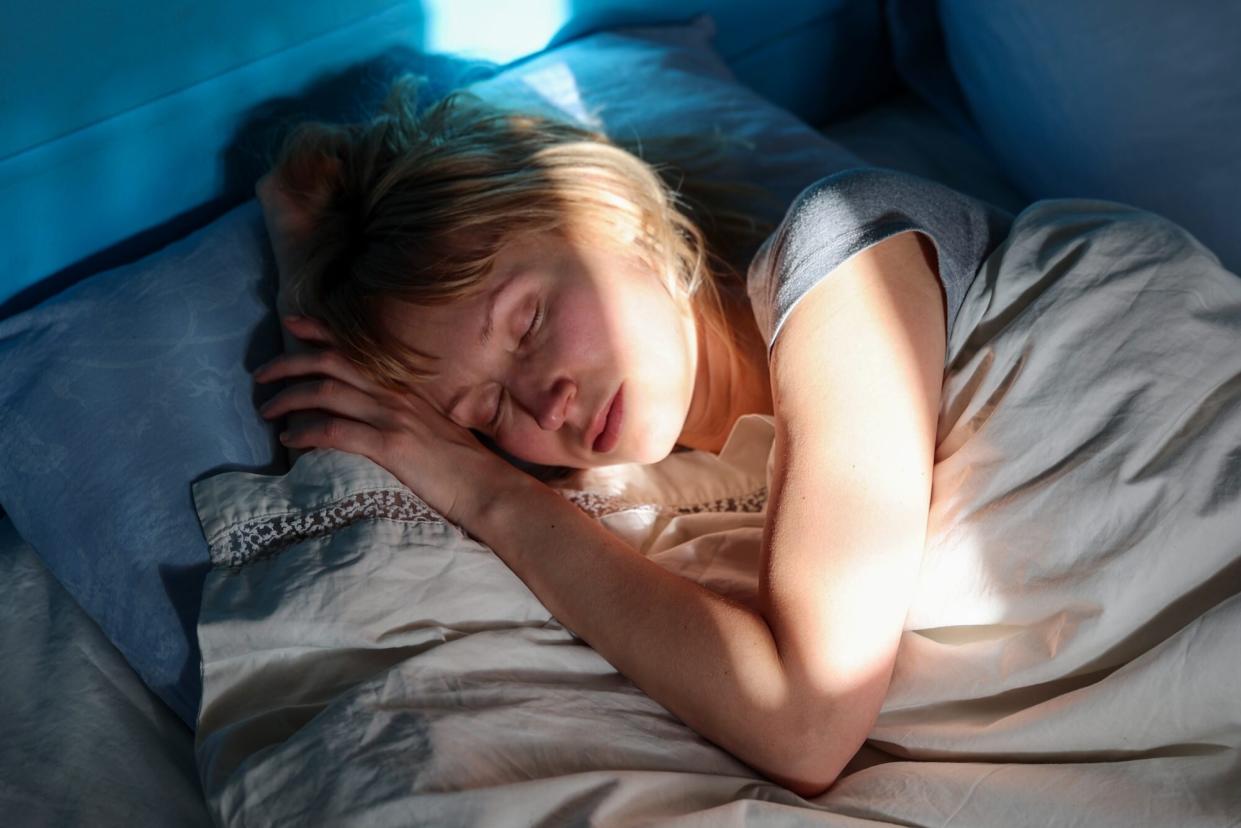Is Your Bedroom Dark Enough? Sleeping With Ambient Light Can Harm Your Health, Study Finds

Elena Karetnikova/Getty Images
If you're struggling to sleep for seven to nine hours every night, remember that you can take (at least some) matters into your own hands. There are several variables you can control to promote better, longer, deeper, and more restorative sleep—and therefore better health overall. For starters, you can stop staring at your phone at least an hour before bed; turn the temperature down to a cool 65 degrees; and avoid consuming caffeine in the late afternoon and evening. You should also make sure your bedroom is as dark as possible. Seriously—your sleep environment should be D-A-R-K, dark, for optimal rest, according to a recent study published in the scientific journal PNAS.
Sleep researchers at Northwestern University's Feinberg School of Medicine found that exposure to even a small amount of ambient light during the night can be harmful to cardiovascular function while you sleep and increase insulin resistance the next morning.
The study's authors acknowledge the current and emerging scientific evidence that excessive evening light exposure may negatively impact metabolic functions, namely decreased glucose tolerance and decreased insulin resistance. In other words, exposure to light before bedtime may impact sleep and some physiological functions.
Our brains use the presence of light as a signal that it's time to be awake and alert, and darkness as a signal that it's time to shut down and sleep. Light exposure activates the sympathetic nervous system (SNS) and increases heart rate so we're up and ready to take on the day. At night, on the other hand, the parasympathetic nervous system (PNS), our rest-and-digest system, should take the lead, promoting relaxation, decreasing heart rate, and maintaining a healthy metabolism. And when the sun goes down and darkness sets in, the brain produces the sleep hormone melatonin, responsible for informing your system that it's time to wind down and snooze. Therefore, exposure to light at night (from bedside lamps to TV screens) has been thought to suppress melatonin production and disrupt the healthy, natural pattern of sleep.
"Your eyes are your direct connection to the part of the brain that controls the circadian rhythm. [Light exposure] is interpreted by the brain to allow the chemical reactions to take place for healthy (or unhealthy) sleep cycles," explains Nilong Vyas, M.D., board-certified pediatrician, sleep consultant at Sleepless in NOLA, and medical review expert at SleepFoundation.org (who is not affiliated with the study). "If there's a significant amount of light interference at a time when your body's trying to sleep, it can cause poor sleep or unhealthily programmed sleep cycles, which can lead to a significant number of other medical issues."
RELATED: Wearable Sleep Trackers Might Be Worth the Hype, Experts Say—Here Are Their Favorites
So what happens when there's too much light in your environment during nighttime sleep? Even if you fall (and stay) asleep just fine, does a blaring street lamp bleeding through the blinds, a muted but very-much-on TV, or even an unassuming nightlight pose a threat to quality Zs? In short: Yes.
For the study, researchers took a group of young, healthy adults and compared data such as their sleep quality, heart rate, and glucose levels during one night of sleeping in a very dark room (3 lux, dim light) and during one night of sleeping in moderately lit room (100 lux). The results found that sleeping in a moderately lit room can increase your heart rate and activate your sympathetic nervous system while you sleep, and also impair your ability to regulate glucose the next morning.
What does this mean for you? It's a science-backed reminder to sleep in as dark a room as possible to upgrade your sleep quality and keep disease at bay. "Attention to avoiding exposure to light at night during sleep may be beneficial for cardiometabolic health," the study concludes. (Inadequate sleep is one of several independent risk factors in the development of cardiometabolic conditions, such as heart disease and diabetes.)
"Gradually decreasing and ultimately eliminating light from your sleep environment will allow for improved sleep," Dr. Vyas says. Here are a few easy steps you can take:
Don't fall asleep with the TV on.
Turn off or remove any devices that create unnecessary light.
Install some effective blackout curtains.
Wear a sleep mask.
If you need a nightlight, choose one that's motion-sensed and placed low, so it will turn on if you step out of bed, says Abhinav Singh, M.D., MPH, FAASM, medical director of the Indiana Sleep Center and medical review expert at SleepFoundation.org.
Avoid white or blue light; instead choose a light in the brown/red/orange spectrum, which is less disruptive.
RELATED: 6 Nightly Techniques to Help You Fall Asleep Fast, According to Sleep Experts
